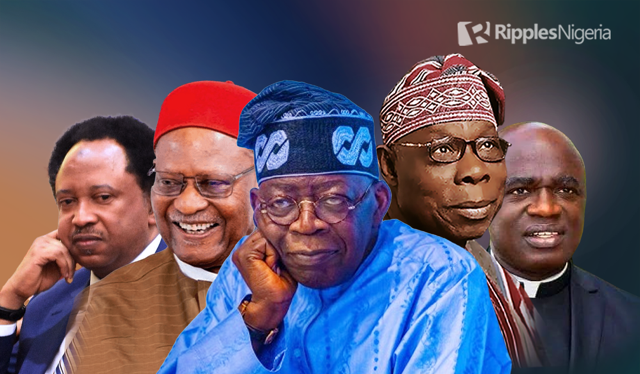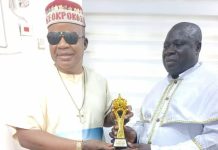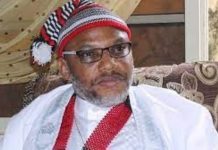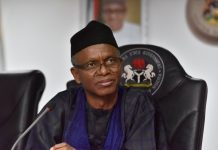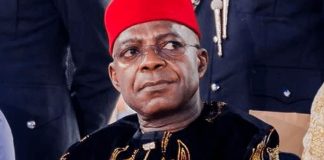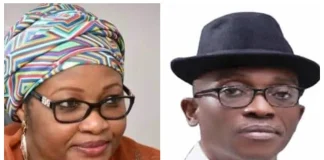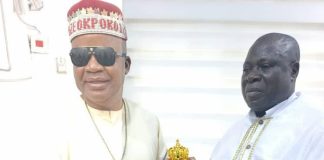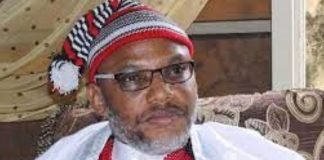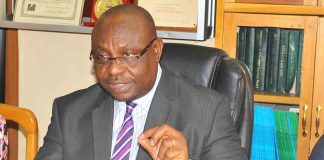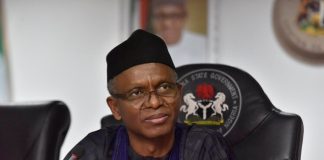🌿 Ruzu Non-Alcoholic Herbal Bitters
Ruzu Non-Alcoholic Herbal Bitters is a natural health supplement specially formulated to:
- ✅ Promote general wellness
- ✅ Detoxify the body
- ✅ Support the treatment of various ailments
Made from a powerful blend of 100% organic and medicinal herbs, Ruzu is completely alcohol-free, making it ideal for:
- 👪 All age groups
- 🌱 Health-conscious individuals
- 🌿 Anyone seeking non-alcoholic herbal remedies
Whether you're looking to boost your vitality, cleanse your system, or support healing the natural way, Ruzu Bitters offers a trusted herbal solution.
A group of eminent individuals in Nigeria, “The Patriots” led by a former Secretary-General of the Commonwealth, Emeka Anyaoku, last week asked President Bola Tinubu to convene a national constituent assembly to produce a new constitution for the country.
The same week, former President Olusegun Obasanjo called for the prosecution of public office holders in the country for abusing their positions.
These and three other stories we tracked dominated public discourse in the country.
1. Anyaoku group renews push for new constitution
On August 9, a group of eminent individuals in Nigeria, “The Patriots” asked President Tinubu to convene a national constituent assembly to produce a new constitution for the country.
Anyaoku, who addressed State House correspondents at the end of a meeting with the president in Abuja, said the constituent assembly would comprise three individuals from each state to be elected by the people on a non-party basis.
He said: “We put some proposals to Mr. President and urged him to send a president’s executive bill to the National Assembly, a bill that will call for two essential measures.
“One the convening of a National Constituent Assembly to be mandated to produce a new draft constitution. We also suggested that such a National Constituent Assembly should consist of individuals elected by the people on a non-party basis.”
Why it matters
The “Patriots” call highlights the desperation of concerned Nigerians to find all manner of solutions to problems besetting the country, with the current constitution identified as the clog in its wheel of progress.
It is also an illustration of the state of disorderliness in Nigeria, a country where economic hardship occasioned by the government’s incoherent policies and insecurity, especially in the North, and dilapidated or obsolete infrastructures have become common features that dot the landscape.
2. Obasanjo on Nigerian leaders
Ex-President Olusegun Obasanjo on August 9 demanded the prosecution of public office holders in Nigeria.
The ex-president spoke when the former chairman of the House of Representatives Committee on Downstream Petroleum, Ugochukwu Chinyere, led six lawmakers promoting the six-year single-term bill to the Olusegun Obasanjo Presidential Library in Abeokuta, Ogun State.
He said: “So, the very beginning is ourselves, yes system, yes we have to rethink our democracy but the character of people in government must change. With all due respect, most of those in government should right now be behind bars or in gallows.”
Why it matters
The ex-president has again touched on the twin problems of bad leadership and corruption regarded by many as the most significant impediments to Nigeria’s development.
The remark highlights the culture of bad governance in Nigeria where corruption has become so pervasive and reached cancerous proportions.
It may as well be said to be an invitation for Nigerians to take another look at the leadership recruitment system that often throws up self-centered individuals for leadership positions to take the country out of the backwater of development.
3. Shehu Sani on North’s violent protests
The former lawmaker for Kaduna Central senatorial district in the National Assembly, Shehu Sani, claimed on August 7 that the violent incidents that accompanied the #EndBadGovernance protests in the Northern part of the country were aimed at overthrowing President Bola Tinubu’s administration.
Sani, who stated this in a Channels Television’s programme, Politics Today, said he gathered that days into the protest, money, and foreign flags were shared among the youths in the North to cause havoc and force a takeover of government.
READ ALSO:QuickRead: Ndume’s removal as Senate chief whip. Four other stories we tracked and why they matter
He said: “A day before the last protest, money was shared with the youths, and Russian flags were also shared. That shows that the whole intent of the protest is not simply about the policies and programmes of the government.”
Why it matters
Sani’s claim if confirmed to be true speaks to the do-or-die attitude that has become the hallmark of Nigeria’s political system and is wholly responsible for the emergence of bad leadership that has dragged the country to its knees in the last few years.
The recent call for military intervention in some quarters however shows the growing discontent among the people for individuals they elected to manage their affairs. But the eight thing is to wait for another election circle to express their discontent via the ballot box.
The uprising may be said to be a timely reminder for the country’s leaders to cut down on their excesses and put the people’s interests above personal interests or risk throwing the country into a constitutional crisis similar to what happened in some West and Central Africa nations last year.
4. IPOB demands referendum
The Indigenous People of Biafra (IPOB) on August 5 criticized those behind the “IgboMustGo” campaign in the South-West and demanded a referendum to determine the Igbo’s exit from Nigeria.
In a statement issued by its Director of Media and Publicity, Emma Powerful, the group alleged that influential figures in Lagos State and Federal governments are behind the “IgboMustGo” movement and cautioned Southerners to be wary of these actions in the South-West.
The statement read: “Following the provocative and genocidal ‘IgboMustGo’ protest planned for August 20-30, 2024, by some anonymous Yoruba groups and individuals, the Indigenous People of Biafra (IPOB) reminds these anti-Igbo groups that Ndigbo is ready to leave Yoruba land and Nigeria through a referendum. We will not be intimidated by any group or individual into leaving any state or region in Nigeria.”
Why it matters
The latest call for the Igbos to leave the country again shows how sharply divided Nigerians are along ethnic lines.
It is unfortunate that ethnicity alongside religion, instead of binding Nigerians together, has widened the fault lines and divided the citizens along sectarian routes.
The mayhem unleashed on Nigerians by criminals and the attitude of politicians have turned Nigerians against each other and strengthened their resolve to sever the links that bind them together.
The onus is therefore on the federal government to find quick solutions to all issues threatening Nigeria’s corporate existence, especially IPOB’s Biafra agitation to save the country from sliding further into anarchy.
5. Suspected herdsmen kill 30 in Benue community
Gunmen suspected to be bandits on August 8 killed at least 30 people in the Ayati community of Ukum local government area of Benue State.
A former governorship aspirant in the state, Mr. Shima Ayati, confirmed the incident.
He said over 30 corpses had been gathered as of Friday morning with search efforts still ongoing.
Ayati said “We were told that some bandits received money from herdsmen and showed them land belonging to the people in two Council Wards for grazing.
“And as they commenced grazing crisis ensued between the herdsmen and the farmers who cried out to the government.”
Why it matters
The latest attack in Benue points to the very fragile nature of the country’s security architecture which has been stretched by years of battle with criminals.
The challenge before the government is to quickly address the problem to prevent the country’s slide into a failed state.
The post QuickRead: Anyaoku group renews push for new constitution. Four stories we tracked and why they matter appeared first on Latest Nigeria News | Top Stories from Naomisophyblog.

